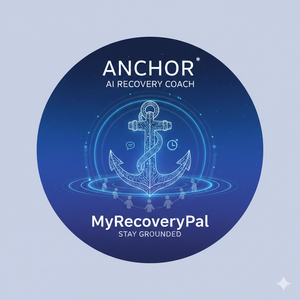
There’s a question I sometimes ask people in recovery meetings that stops them cold: “If you could ask God what He thinks about you, what do YOU think He would say?”
The silence that follows is deafening.
Ready to explore your own spiritual journey in recovery? My recovery journal on Amazon includes daily prompts designed to help you build a stronger spiritual foundation and combat negative self-talk with gratitude and reflection.
The Mirror We Don’t Want to Look Into
Nine times out of ten, the responses come wrapped in shame:
“I’m not good enough.” “He’s disappointed in me.” “I’ve wasted too much time.” “He’s angry about what I’ve done.” “I could be so much better.”
Here’s the thing — this question isn’t really about God at all. It’s a mirror reflecting exactly how we feel about ourselves. We project our own self-loathing onto the divine, creating a God who sounds suspiciously like our harshest inner critic.
In recovery, this negative self-perception isn’t just uncomfortable — it’s dangerous. Because when you’re convinced that even God thinks you’re a disappointment, picking up that bottle again starts to make a twisted kind of sense.
The Daily Battle with Our Former Selves
After seven years sober, I still wake up some mornings with my old self knocking at the door. Not the drinking self necessarily, but the shame-filled version who remembers every failure, every hurt I caused, every moment I chose whiskey over my family.
As they say in AA, we get a “daily reprieve contingent on the maintenance of our spiritual condition.” That’s not just program-speak — it’s survival truth. Our recovery isn’t a one-time event but a daily choice to silence the voice that says we’re not worth saving.
The negative mental pathways we carved during active addiction don’t just disappear when we get sober. They’re like well-worn trails in our minds, and our thoughts naturally want to follow them. Without daily spiritual maintenance — prayer, meditation, meetings, service — we default back to those familiar paths of self-destruction.
What Scripture Actually Says
Here’s what blows my mind every time I read it. In Luke 15, Jesus tells the parable of the Prodigal Son. This kid takes his inheritance early (basically wishing his father dead), blows it all on wild living, ends up eating pig slop, and finally drags himself home expecting to be treated like a servant.
But what does the father do? He runs to meet him. Not walks — runs. In that culture, dignified men didn’t run. But this father abandons all dignity to embrace his lost child. Before the son can even finish his rehearsed apology, the father is calling for the best robe, a ring, sandals, and a feast.
That’s the God we’re talking about. Not the disappointed taskmaster we imagine, but the one who runs toward us in our mess.
Or consider Zephaniah 3:17: “The Lord your God is with you, the Mighty Warrior who saves. He will take great delight in you; in his love he will no longer rebuke you, but will rejoice over you with singing.”
God literally sings over us. When was the last time you imagined God singing with joy about your existence?
The Spiritual Truth About Recovery
In Isaiah 43:18–19, God says, “Forget the former things; do not dwell on the past. See, I am doing a new thing! Now it springs up; do you not perceive it?”
This isn’t just ancient poetry — it’s recovery theology. God isn’t sitting around keeping score of our failures. He’s not maintaining a cosmic spreadsheet of disappointments. He’s literally telling us to stop dwelling on what was and look at what He’s creating now.
Every person in recovery is living proof of this “new thing.” We’re walking miracles, whether we feel like it or not. The fact that we woke up sober today? That’s God celebrating. The fact that we chose a meeting over a bar? That’s divine rejoicing.
Keeping Short Accounts with Ourselves
In recovery, we learn to make amends quickly and keep short accounts with others. But somehow, we forget to extend that same grace to ourselves. We forgive others their trespasses but hold our own in a death grip.
God keeps short accounts. Once we’ve made amends and changed our behavior, He’s moved on. He’s not up there replaying our greatest hits of failure. As it says in Psalm 103:12, “As far as the east is from the west, so far has he removed our transgressions from us.”
East and west never meet. That’s how far our mistakes are from God’s current thoughts about us.
The Daily Practice of Rewriting the Narrative
When I find myself spiraling into negative self-talk, I’ve learned to counter with gratitude. Not toxic positivity, but genuine acknowledgment of what’s real and good:
- I woke up sober today
- My daughter has her father back
- I have a job I’m thriving in
- I chair a meeting where I can help others
- I’m building something new every single day
This isn’t just feel-good recovery rhetoric. It’s spiritual warfare against the voice that wants to keep us sick. Because here’s what I’ve learned after seven years: the voice telling you that you’re not enough, that you’re a disappointment, that you should be better — that’s not God’s voice. That’s addiction trying to find a way back in.
What God Actually Thinks
If you really want to know what God thinks about you in recovery, look at the evidence:
You’re still here. Despite everything you’ve been through, every close call, every moment you should have died or given up — you’re still here. That’s not luck. That’s love.
You’re fighting for something better. Even on days when you don’t feel strong, the fact that you’re still in the fight means something. God doesn’t champion quitters, but He absolutely champions fighters who keep getting back up.
You’re becoming who you were meant to be. Every day sober is a day closer to the person God created you to be before addiction hijacked your story.
The Truth That Changes Everything
So if you could ask God what He thinks about you, what would He really say?
Based on everything Scripture tells us, based on the evidence of millions in recovery, based on the miracle of transformation happening in your own life, I think He’d say something like:
“I’m proud of you. I see your struggle and I’m with you in it. Your past doesn’t define you — I do. And I say you’re loved, you’re valued, and you’re exactly where you need to be. Keep going. I’m not finished with you yet.”
The question isn’t really what God thinks about you. The question is: when will you start thinking about yourself the way God does?
Because recovery isn’t just about putting down the bottle. It’s about picking up the truth of who you really are — not the story addiction told you, but the story grace is writing.
And that story? It’s worth celebrating every single day.
Ryan is 7 years sober and chairs a Monday afternoon AA meeting in Springfield. He writes daily about recovery at Normalize Sobriety and creates recovery resources to help others navigate their spiritual journey in sobriety. Because recovery isn’t just about staying sober — it’s about discovering who you were meant to be.


Comments (0)
Login to leave a comment.
No comments yet. Be the first to share your thoughts!